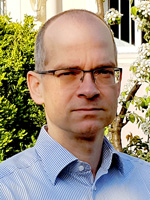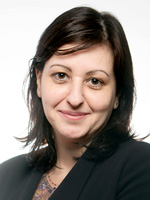

ECMWF has appointed three scientists working in the fields of data assimilation, atmospheric physics and hydrometeorology to its Fellowship programme.
Dr Louise Nuijens (TU Delft), Prof. Marc Bocquet (École des Ponts ParisTech) and Dr Maria-Helena Ramos (Irstea) begin their three-year Fellowship terms on 1 January 2019.
The ECMWF Fellowship Programme was launched in 2014 to foster collaboration with renowned international scientists. Each of the new Fellows has been selected because of their expertise in their respective field and because their scientific work is closely related to ECMWF’s strategic goal of improving weather forecast skill in the medium and extended range.
 Louise Nuijens is an assistant professor in the Department of Geosciences and Remote Sensing at Delft University of Technology (TU Delft) in the Netherlands.
Louise Nuijens is an assistant professor in the Department of Geosciences and Remote Sensing at Delft University of Technology (TU Delft) in the Netherlands.
Her group explores the role of convective clouds in atmospheric processes, with a special focus on how they influence the winds that carry them around.
Previously, Louise worked as a postdoctoral fellow in the Department of Earth, Atmosphere and Planetary Sciences at MIT in Boston, and as a group leader of the Observations and Process Studies group in the Atmosphere Department of the Max-Planck Institute for Meteorology in Hamburg.
Louise already has strong connections with ECMWF, having co-authored papers with ECMWF scientists and given presentations as part of ECMWF’s Annual Seminar and informal seminar series.
During her Fellowship, Louise will work with scientists from the Physical Processes Team of ECMWF’s Research Department. One potential area of collaboration involves momentum transport in the presence of moist convection. This is related to the work of Louise and her group in the CloudBrake project, funded by the European Research Council, which strives to expose the coupling of clouds and the vertical structure of wind, thereby aiding development of parametrizations for improved numerical weather prediction, climate modelling, and wind energy design.
 Marc Bocquet is a senior researcher and deputy director of CEREA, a joint laboratory of École des Ponts ParisTech and EdF R&D, and Professor at École des Ponts ParisTech in France.
Marc Bocquet is a senior researcher and deputy director of CEREA, a joint laboratory of École des Ponts ParisTech and EdF R&D, and Professor at École des Ponts ParisTech in France.
Marc works in the field of data assimilation and inverse problems in the geosciences, as well as in environmental statistics. He develops new mathematical methods to better estimate the state of the atmosphere and the ocean, using large sets of observations and complex models. His current topics of interest include ensemble Kalman and particle filtering, error estimation techniques, regularisation in ensemble methods, data assimilation and dynamical systems, and nonlinear sampling. Moreover, he applies these methods to dispersion and atmospheric chemical transport models, with a focus on inverse problems.
At ECMWF’s 2018 Annual Seminar, Marc showed how methods to account for sparse observation networks could be applied to atmospheric composition analysis, to create an adaptive approach that could evolve with the observing system.
During his Fellowship, Marc and his group will work with the Data Assimilation Methodology Team in ECMWF’s Research Department. One possible area of collaboration concerns the potential benefits of the current machine learning revolution for data assimilation in general and as implemented at ECMWF specifically.
 Maria-Helena Ramos is a Research Scientist in hydrology and hydrometeorology at the National Research Institute of Science and Technology for Environment and Agriculture (Irstea) in France.
Maria-Helena Ramos is a Research Scientist in hydrology and hydrometeorology at the National Research Institute of Science and Technology for Environment and Agriculture (Irstea) in France.
She is also an occasional lecturer at Sorbonne Université, Polytech Paris-UPMC and EIVP Engineering school in Paris. She has participated in several national and European research and innovation projects, published over 100 scientific papers and reports, organised training courses on flood forecasting and uncertainty for postgraduate students and professionals, and co-authored several games for teaching and training on the use of probabilistic predictions in hydrology.
Maria-Helena has considerable experience of using ensemble data from ECMWF to investigate efficient ways of integrating meteorological products into hydrological modelling systems and to develop new applications for decision-making in the water sector. Her strong involvement in the HEPEX initiative, as well as work with ECMWF in 2017 to support authorities in Peru during a major flooding event, means she is already well known at the Centre.
The Fellowship will strengthen links between Maria-Helena and ECMWF’s Environmental Forecasts Team, with her expertise being particularly relevant to the Centre’s goal of improving the land surface component of its Earth system model and to its activities in the Copernicus Emergency Management Service (Floods).
ECMWF Director of Forecasts Florian Pappenberger welcomed the new appointments:
“We are proud to welcome Marc, Louise and Maria-Helena as ECMWF Fellows and look forward to working with them and their research colleagues to the best mutual benefit. Their expertise in their respective fields will be invaluable as we continue to refine our models of the Earth system and to develop applications that make a real difference for decision-makers and society.”
Fellows have access to ECMWF’s facilities and databases and to a limited amount of annual funding. They are invited to present results from their research work as part of ECMWF’s seminar series and encouraged to provide regular, short reports of the key results of their work for inclusion in relevant ECMWF publications.
The three new appointments take the total number of ECMWF Fellows to eight. Information about all current ECMWF Fellows is available on our Serving meteorology page.